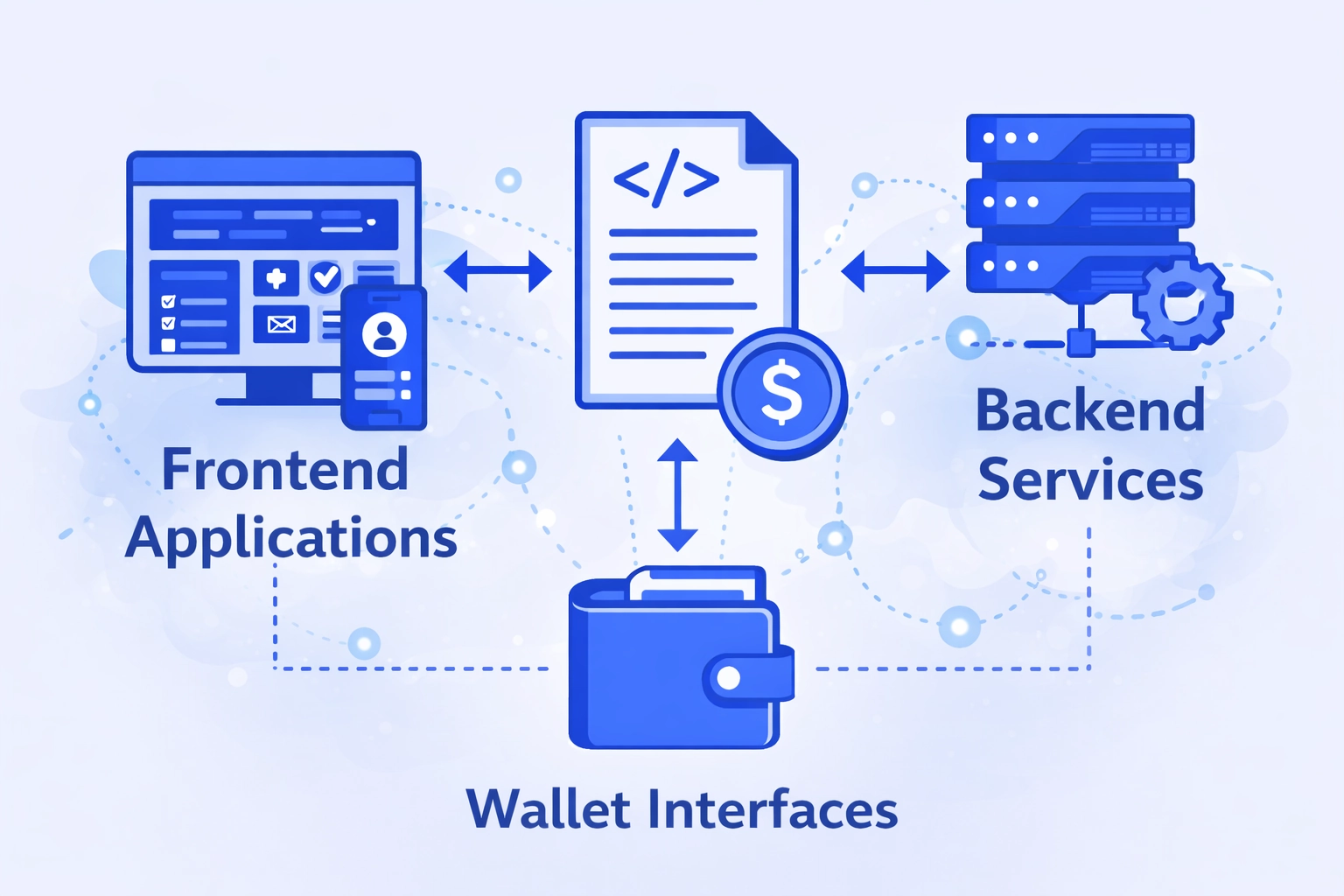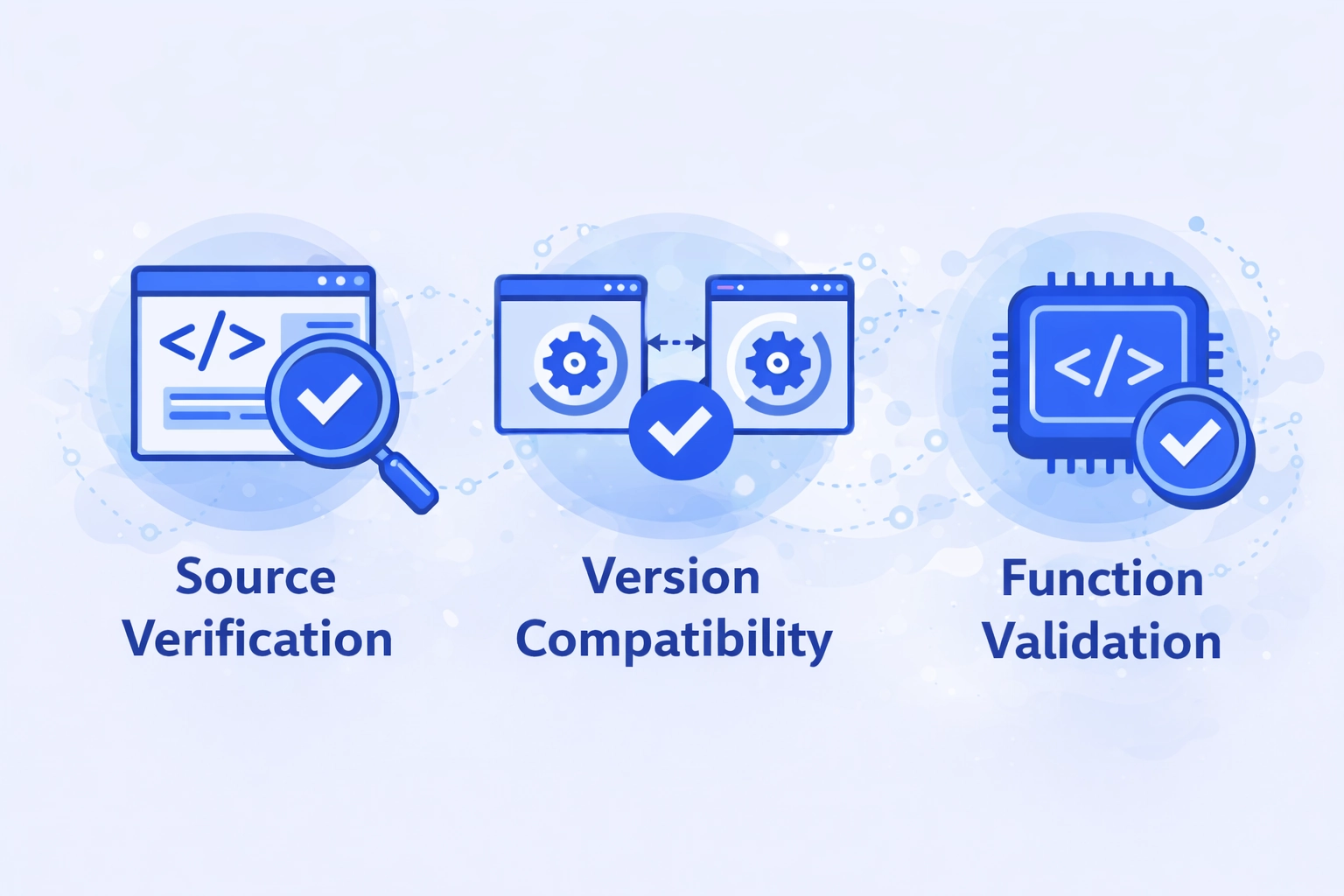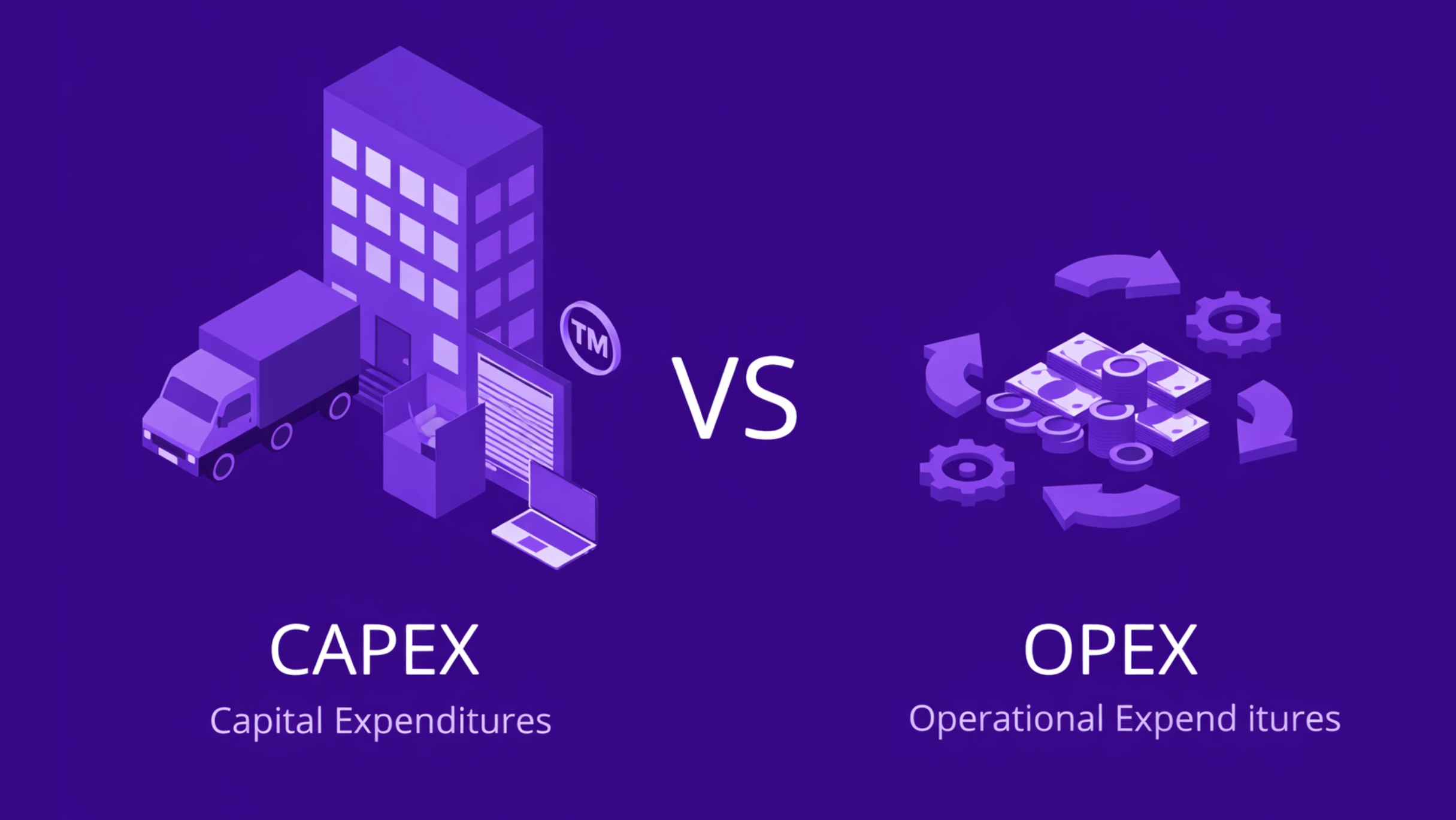Key Takeaways
- Smart Contract ABI serves as a JSON specification enabling external applications to communicate with deployed blockchain contracts through standardized function definitions.
- The ABI acts as a translation layer between human-readable function calls and blockchain-compatible bytecode, essential for all contract interactions.
- Every function, event, and parameter in a smart contract has corresponding ABI entries that define data types, names, and encoding requirements.
- Wallets like MetaMask, dApps across USA, UK, UAE, and Canada, and block explorers all rely on Smart Contract ABI for proper transaction formatting.
- ABI encoding converts function parameters into hexadecimal format while decoding transforms blockchain responses back into readable data structures.
- Security best practices require verifying Smart Contract ABI from trusted sources to prevent malicious function calls or transaction manipulation.
- EVM-compatible networks share standardized ABI formats, enabling cross-chain compatibility for Ethereum, Polygon, BSC, and Arbitrum deployments.
- Understanding Smart Contract ABI is fundamental for building integrations, auditing contracts, and ensuring secure blockchain application architecture.
Introduction to Smart Contract ABI
The Smart Contract ABI represents one of the most critical yet often overlooked components in blockchain architecture. With over eight years of experience building enterprise blockchain solutions across USA, UK, UAE, and Canadian markets, our agency has witnessed countless integration failures stemming from ABI misunderstandings. This interface specification serves as the essential bridge enabling applications, wallets, and services to interact with deployed smart contracts. Without proper ABI implementation, even the most sophisticated smart contract remains inaccessible to external systems. This comprehensive guide explores every aspect of Smart Contract ABI, providing actionable insights for technical teams and business stakeholders seeking reliable blockchain integrations.
What Does ABI Mean in Smart Contracts?
ABI stands for Application Binary Interface, a standardized specification describing how to interact with smart contract functions at the binary level. The Smart Contract ABI defines function names, parameter types, return values, and event signatures in JSON format. Unlike APIs that operate over network protocols, ABIs enable direct communication with blockchain bytecode. When you call a function on a deployed contract, the ABI translates your request into the exact byte sequence the Ethereum Virtual Machine understands, ensuring precise execution of intended operations.

How ABI Acts as a Bridge Between Blockchain and Applications
Frontend Applications
- Web3.js library integration
- Ethers.js contract instances
- React/Vue dApp connections
- Mobile app interactions
Backend Services
- Transaction monitoring systems
- Automated trading bots
- Analytics platforms
- Indexing services
Wallet Interfaces
- MetaMask transaction parsing
- Hardware wallet signing
- Multi-sig coordination
- Transaction simulation
Structure of a Smart Contract ABI Explained
| ABI Element | Description | Example |
|---|---|---|
| type | Defines entry type | function, event, constructor |
| name | Function or event name | transfer, approve, Transfer |
| inputs | Array of input parameters | [{name: “to”, type: “address”}] |
| outputs | Array of return values | [{name: “”, type: “bool”}] |
| stateMutability | Function state behavior | view, pure, nonpayable, payable |
Functions, Events, and Parameters in an ABI
The Smart Contract ABI contains three primary element types that define all possible interactions. Functions represent callable operations that may read or modify contract state. Events provide logging mechanisms for off-chain applications to track on-chain activities. Parameters within both functions and events specify exact data types including uint256, address, bytes32, and complex structures like arrays and tuples. Our implementations across USA, UK, UAE, and Canadian projects demonstrate that precise parameter typing prevents 90% of integration errors.
Industry Standard: ERC-20 and ERC-721 token standards define exact ABI specifications ensuring universal wallet and exchange compatibility.
How ABI Enables Interaction With Deployed Smart Contracts
| Interaction Step | ABI Role | Output |
|---|---|---|
| Function Selection | Identifies target function | 4-byte function selector |
| Parameter Encoding | Converts inputs to hex | Encoded calldata bytes |
| Transaction Building | Combines selector + data | Complete transaction data |
| Response Decoding | Parses return values | Typed JavaScript objects |
| Event Parsing | Decodes log entries | Structured event data |
Difference Between Smart Contract Code and ABI
Understanding the distinction between source code and Smart Contract ABI is fundamental for blockchain professionals. Source code contains the complete implementation logic, algorithms, and state management written in Solidity or similar languages. The ABI, conversely, describes only the external interface without revealing internal operations. Think of source code as the complete blueprint while the ABI serves as the instruction manual for users. This separation enables secure interaction without exposing proprietary algorithms.
Complete Implementation
Compiled Machine Code
Interface Specification
Role of ABI in Transaction Execution
Every blockchain transaction targeting a smart contract relies on the Smart Contract ABI for proper execution. When users initiate token transfers, swap trades, or governance votes, the ABI encodes their intent into transaction calldata. The EVM uses function selectors (first 4 bytes of the keccak256 hash of function signature) to route calls correctly. Without accurate ABI encoding, transactions fail or execute unintended functions. Major DeFi protocols across Dubai, London, and North American markets process billions in daily volume depending on precise ABI implementations.
Smart Contract ABI Integration Lifecycle
Contract Compilation
Solidity compiler generates both bytecode and ABI JSON from source code during build process.
ABI Extraction
Extract ABI JSON file from compilation artifacts for frontend and backend integration use.
Contract Instance Creation
Initialize contract object using ABI and deployed address with Web3.js or Ethers.js library.
Function Call Preparation
ABI automatically encodes function parameters into proper hexadecimal calldata format.
Transaction Submission
Submit encoded transaction to blockchain network for validation and execution by miners.
Response Decoding
ABI decodes return values from hexadecimal into typed JavaScript or Python objects.
Event Monitoring
Subscribe to contract events using ABI definitions to receive real-time blockchain updates.
Error Handling
Parse custom error messages and revert reasons using ABI error definitions for debugging.
How Wallets and Interfaces Use Smart Contract ABI
Cryptocurrency wallets and decentralized application interfaces depend heavily on Smart Contract ABI for user-friendly interactions. When MetaMask displays a token transfer confirmation, it uses the ABI to decode calldata into human-readable information showing recipient address and amount. Block explorers like Etherscan provide “Read Contract” and “Write Contract” interfaces generated entirely from verified ABIs. Hardware wallets use ABIs to display transaction details for user verification before signing. This ubiquitous ABI usage ensures consistent user experiences across the blockchain ecosystem.[1]
Master Smart Contract ABI Integration
Our blockchain experts help you implement secure Smart Contract ABI integrations for seamless dApp functionality. Get reliable contract interaction today.
ABI Encoding and Decoding Explained Simply
Encoding Process
- Function signature hashing
- Parameter type identification
- Value serialization to hex
- Calldata assembly
Decoding Process
- Return data extraction
- Type mapping from ABI
- Hex to native conversion
- Structured object creation
Common Data Types
- uint256 (32-byte integers)
- address (20-byte addresses)
- bytes32 (fixed byte arrays)
- string (dynamic strings)
Common Use Cases of Smart Contract ABI
| Use Case | ABI Application | Industry Example |
|---|---|---|
| DeFi Protocol Integration | Swap, lend, stake functions | Uniswap, Aave, Compound |
| NFT Marketplace | Mint, transfer, approve | OpenSea, Rarible |
| DAO Governance | Vote, propose, execute | MakerDAO, Compound Gov |
| Token Analytics | Balance, supply queries | Dune Analytics, Nansen |
| Automated Trading | Price feeds, swap execution | Trading bots, arbitrage |
Security Considerations Related to ABI Usage
Security risks associated with Smart Contract ABI require careful attention from blockchain professionals. Malicious ABIs can mask dangerous function calls behind innocent-appearing interfaces. Attackers may distribute modified ABIs that redirect funds to unauthorized addresses. Always obtain ABIs from verified sources like Etherscan, official project documentation, or compiled directly from audited source code. Our security teams across USA, UK, UAE, and Canadian implementations mandate ABI verification as a standard security protocol.

ABI Integration Selection Criteria
Source Verification
- Verify contract on Etherscan
- Compare with official docs
- Check GitHub repositories
- Compile from source code
Version Compatibility
- Match ABI to deployed version
- Check for proxy patterns
- Verify upgrade compatibility
- Monitor version changes
Function Validation
- Test on testnet first
- Verify function signatures
- Check parameter types
- Validate return values
ABI Compatibility Across Blockchain Networks
| Network | ABI Format | Compatibility |
|---|---|---|
| Ethereum | Standard JSON ABI | Reference implementation |
| Polygon | Standard JSON ABI | Fully EVM compatible |
| BSC | Standard JSON ABI | Fully EVM compatible |
| Solana | IDL (Interface Definition) | Non-EVM, different format |
| Arbitrum | Standard JSON ABI | Fully EVM compatible |
Authoritative Industry Standards for Smart Contract ABI
Standard 1: Always obtain Smart Contract ABI from verified sources to prevent malicious function call manipulation.
Standard 2: Version-lock ABIs with deployed contract addresses to prevent interface mismatches during upgrades.
Standard 3: Test all ABI interactions on testnet before deploying production integrations with real value.
Standard 4: Implement comprehensive error handling for all ABI-encoded function calls and responses.
Standard 5: Document all ABI dependencies and maintain update procedures for contract version changes.
Standard 6: Use TypeScript or similar typed interfaces generated from ABIs for type-safe contract interactions.
ABI Integration Compliance Checklist
| Requirement | Description | Priority |
|---|---|---|
| Source Verification | Obtain ABI from verified contract or official documentation | Critical |
| Version Matching | Ensure ABI matches deployed contract version exactly | Critical |
| Testnet Validation | Test all function calls on testnet before production use | High |
| Error Handling | Implement proper error decoding and user feedback | High |
| Documentation | Maintain ABI change logs and update procedures | High |
Importance of ABI in the Smart Contract Ecosystem
The Smart Contract ABI represents the essential interface layer enabling the entire decentralized application ecosystem to function. Without standardized ABIs, every wallet, dApp, and service would require custom integration code for each contract. This standardization has enabled explosive growth in DeFi, NFTs, and Web3 applications across USA, UK, UAE, and Canadian markets. Understanding ABI mechanics empowers teams to build reliable integrations, audit contract interfaces, and ensure secure blockchain interactions.
With eight years of experience implementing blockchain solutions, our agency has witnessed Smart Contract ABI evolve from a technical detail to a fundamental competency for blockchain professionals. Teams mastering ABI concepts deliver faster integrations, fewer bugs, and more secure applications. As the blockchain ecosystem continues expanding, ABI literacy becomes increasingly essential for anyone building or interacting with decentralized systems.
Build Reliable Smart Contract Integrations
Partner with our experienced blockchain team to implement secure Smart Contract ABI integrations for your applications across USA, UK, UAE, and Canada.
Frequently Asked Questions
A Smart Contract ABI (Application Binary Interface) is a JSON-formatted specification defining how external applications interact with deployed blockchain contracts. It describes function signatures, parameters, and return types, enabling wallets, dApps, and interfaces to communicate correctly with on-chain smart contract code.
Smart contract source code contains the actual programming logic written in Solidity or Vyper, while the Smart Contract ABI serves as an interface specification. The ABI describes what functions exist and how to call them without revealing implementation details or internal logic.
Technically possible but extremely difficult without the Smart Contract ABI. You would need to manually encode function calls and decode responses using raw hexadecimal data. The ABI automates this process, making contract interaction practical for applications and users.
Smart Contract ABI can be obtained from block explorers like Etherscan for verified contracts, project documentation, GitHub repositories, or by compiling the source code yourself. Many DeFi protocols publish ABIs in their official documentation for integration purposes.
The Smart Contract ABI format is standardized across EVM-compatible networks including Ethereum, Polygon, BSC, and Arbitrum. However, non-EVM chains like Solana use different interface specifications, requiring network-specific approaches for contract interaction.
MetaMask and similar wallets use the Smart Contract ABI to encode transaction data when users interact with dApps. The ABI translates user actions into properly formatted function calls that the blockchain can execute, then decodes responses for display.
Using incorrect or malicious Smart Contract ABI can result in failed transactions, lost funds, or unintended function execution. Always verify ABIs from trusted sources, especially when interacting with contracts handling significant value or sensitive operations.
Reviewed & Edited By

Aman Vaths
Founder of Nadcab Labs
Aman Vaths is the Founder & CTO of Nadcab Labs, a global digital engineering company delivering enterprise-grade solutions across AI, Web3, Blockchain, Big Data, Cloud, Cybersecurity, and Modern Application Development. With deep technical leadership and product innovation experience, Aman has positioned Nadcab Labs as one of the most advanced engineering companies driving the next era of intelligent, secure, and scalable software systems. Under his leadership, Nadcab Labs has built 2,000+ global projects across sectors including fintech, banking, healthcare, real estate, logistics, gaming, manufacturing, and next-generation DePIN networks. Aman’s strength lies in architecting high-performance systems, end-to-end platform engineering, and designing enterprise solutions that operate at global scale.







